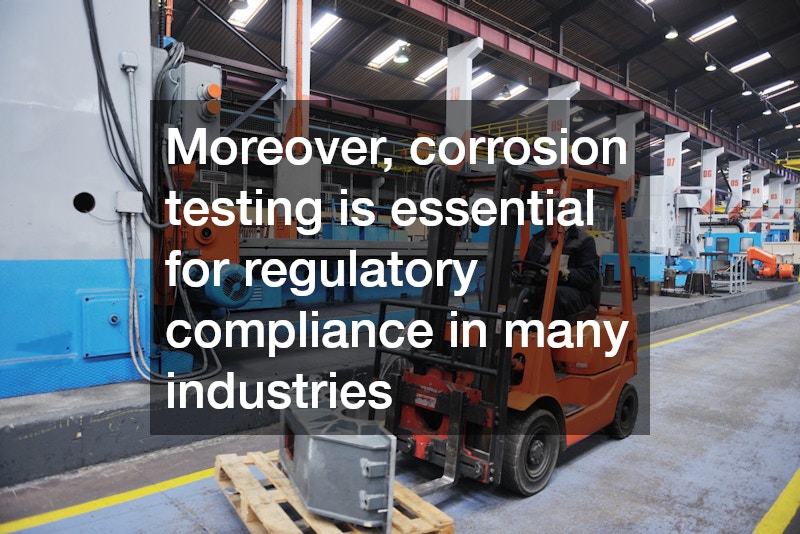Corrosion testing plays a crucial role in safeguarding the longevity and effectiveness of materials, especially in industries dealing with metals and other vulnerable materials. When it comes to managing and conducting these tests, the choice of hiring a local corrosion testing company is of paramount importance. This decision can have far-reaching implications, both in terms of the accuracy of results and the overall impact of corrosion on infrastructure and products.
By understanding the nuances of local testing services, businesses can better protect their investments and ensure compliance with safety standards.
Hiring a local company for corrosion testing offers a myriad of benefits that extend beyond geographical convenience. Local firms typically boast familiarity with regional climate concerns, material usage, and environmental factors that can affect corrosion rates. This local expertise can be invaluable in tailoring testing protocols to match specific conditions. In addition, working with nearby experts facilitates better communication and efficiency in project execution.
What is Corrosion Testing and Why is it Important?
Corrosion testing is a process that evaluates the resistance of materials, especially metals, to corrosive environments. This type of testing is vital for understanding how materials will perform over time when exposed to various conditions such as humidity, temperature fluctuations, chemicals, and salinity. The insights gained from corrosion testing help in predicting the lifespan and maintenance needs of materials and structures.
The importance of corrosion testing lies in its ability to prevent material degradation, which can lead to severe structural failures. By identifying potential corrosive threats early, businesses and engineers can take mitigative actions such as applying protective coatings, selecting more resilient materials, or designing structures that reduce exposure to corrosive elements. Such proactive measures ensure continued structural integrity and functionality, which are critical for safety and efficiency.
Moreover, corrosion testing is essential for regulatory compliance in many industries. Governments and industry bodies often set stringent standards relating to material durability and safety. Regular testing ensures that companies meet these requirements, avoiding penalties and maintaining reputational trust. Beyond compliance and safety, understanding corrosion behavior also aids in optimizing material performance, which can result in significant cost savings through improved maintenance plans and reduced downtime.
What are the Benefits of Hiring a Local Company?
One of the primary benefits of hiring a local corrosion testing company is cost efficiency. Local companies often offer competitive pricing due to lower travel expenses and reduced logistical challenges. The proximity allows for more frequent site visits and inspections, ensuring comprehensive coverage without incurring high costs. Local firms often have established relationships with local suppliers and partners, further optimizing resource allocation and cost-effectiveness.
Accessibility is another significant advantage of working with a local company. Clients can expect faster response times and flexibility in scheduling tests or inspections. In urgent situations where immediate attention is required, local companies can mobilize quickly, minimizing downtime and potential operational disruptions. This level of service is especially crucial for industries that operate in dynamic environments where conditions and requirements can change rapidly.
Local expertise is also invaluable when it comes to corrosion testing. Companies based in the vicinity are more likely to have insights into regional environmental factors that influence corrosion rates. They are familiar with local regulations, industry standards, and best practices that pertain to materials and construction methodologies in the area. This knowledge ensures that testing protocols are not only technically sound but also contextually relevant, enhancing the reliability and applicability of the results.
What Should You Consider When Choosing a Corrosion Testing Company?
When choosing a corrosion testing company, one of the key factors to consider is the company’s qualifications and experience. Look for companies that have a proven track record in the industry and employ certified professionals with expertise in various testing methodologies. Experience in handling similar projects, especially in the same geographic region, can be particularly beneficial as it indicates familiarity with relevant challenges and best practice solutions.
It is also essential to evaluate the range of services offered by the company. A comprehensive suite of testing services—with options for different types of materials, environments, and testing techniques—indicates a versatile and well-equipped company. Ensure that the company uses advanced technology and methodologies to deliver precise and accurate results, and check if they offer customized testing solutions tailored to your specific needs.
Customer reviews and references are invaluable resources when selecting a corrosion testing company. Feedback from past clients can provide insight into the company’s reliability, quality of service, and responsiveness. References from industry peers or similar projects provide further assurance of the company’s capability to meet your testing requirements. Ultimately, selecting a corrosion testing company involves balancing expertise, service quality, and cost-effectiveness, ensuring that you choose a partner that aligns with your goals and budget.
Hiring a local corrosion testing company is an investment in safeguarding the structural integrity and longevity of materials used within your projects. Local companies provide specific advantages, including cost efficiency, accessibility, and deep-rooted expertise on regional environmental factors. Their ability to offer tailored solutions and conduct thorough testing ensures accurate and actionable results, crucial for maintaining safety, efficiency, and compliance.




